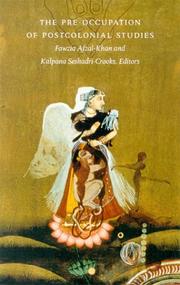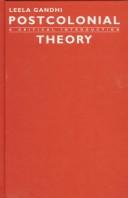| Listing 1 - 10 of 2391 | << page >> |
Sort by
|
Book
ISBN: 9780199588251 0199588252 0199588252 Year: 2013 Publisher: Oxford: Oxford University Press,
Abstract | Keywords | Export | Availability | Bookmark
 Loading...
Loading...Choose an application
- Reference Manager
- EndNote
- RefWorks (Direct export to RefWorks)
This book provides a comprehensive overview of the latest scholarship in postcolonial studies, while also considering possible future developments in the field. Original chapters written by a worldwide team of contritbuors are organised into five cross-referenced sections, 'The Imperial Past', 'The Colonial Present', 'Theory and Practice', 'Across the Disciplines', and 'Across the World'. The chapters offer both country-specific and comparative approaches to current issues, offering a wide range of new and interesting perspectives. The 'Handbook' reflects the increasingly multidisciplinary nature of postcolonial studies and reiterates its continuing relevance to the study of both the colonial past - in its multiple manifestations - and the contemporary globalized world. Taken together, these essays, the dialogues they pursue, and the editorial comments that surround them constitute nothing less than a blueprint for the future of a much-contested but intellectually vibrant and politically engaged field
Book
ISBN: 9956550329 9789956550326 9789956550425 9956550426 Year: 2019 Publisher: Baltimore, Maryland : Baltimore, Md. : Project Muse, Project MUSE,
Abstract | Keywords | Export | Availability | Bookmark
 Loading...
Loading...Choose an application
- Reference Manager
- EndNote
- RefWorks (Direct export to RefWorks)
Violence in its various proportions, genres and manifestations has had an enduring historical legacy the world over. However, works speaking to approaches aimed at mitigating violence characteristic of Africa are very limited. As some scholars have noted, Africans have experienced cycles of violence since the pre-colonial epoch, such that overt violence has become banalised on the African continent. This has had the effect of generating complex results, legacies and perennial emotional wounds that call for healing, reconciliation, justice and positive peace. Yet, in the absence of systematic and critical approaches to the study of violence on the continent, discourses on violence would hardly challenge the global matrices of violence that threaten peace and development in Africa. This volume is a contribution in the direction of such urgently needed systematic and critical approaches. It interrogates, from different angles and with inspiration from a multidisciplinary perspective, the contentious production and resilience of violence in Africa. It calls for a paradigm shift -- an alternative approach that forges and merges African customary dispute resolution and Western systems of dispute resolution -- towards a framework of positive peace, holistic restoration, sustainable development and equity. The book is a welcome contribution to students and practitioners in security studies, African studies, development studies, global studies, policy studies, and political science.
Book
Year: 2003 Publisher: Lexington, KY: University of Kentucky,
Abstract | Keywords | Export | Availability | Bookmark
 Loading...
Loading...Choose an application
- Reference Manager
- EndNote
- RefWorks (Direct export to RefWorks)

ISBN: 0822325217 Year: 2000 Publisher: Durham (N.C.) : Duke university press,
Abstract | Keywords | Export | Availability | Bookmark
 Loading...
Loading...Choose an application
- Reference Manager
- EndNote
- RefWorks (Direct export to RefWorks)

ISBN: 0231112726 0231112734 Year: 1998 Publisher: New York : Columbia University Press,
Abstract | Keywords | Export | Availability | Bookmark
 Loading...
Loading...Choose an application
- Reference Manager
- EndNote
- RefWorks (Direct export to RefWorks)
Book
ISBN: 9783899423372 3899423372 Year: 2005 Publisher: Bielefeld: Transcript,
Abstract | Keywords | Export | Availability | Bookmark
 Loading...
Loading...Choose an application
- Reference Manager
- EndNote
- RefWorks (Direct export to RefWorks)
Book
Year: 2021 Publisher: Göttingen : Universitätsverlag Göttingen,
Abstract | Keywords | Export | Availability | Bookmark
 Loading...
Loading...Choose an application
- Reference Manager
- EndNote
- RefWorks (Direct export to RefWorks)
All over the world, borders are places of separation, distinction and violence on the one hand, and of encounter, mobility and everyday practices on the other. This is particularly true of the external borders of the European Union. When Spain joined the European Communities in 1986, Ceuta and Melilla, two cities in North Africa, became such an external border and the six-metre-high fences surrounding them became a symbol of "Fortress Europe". But what does this mean for the people who live in such a place? How do they experience everyday life in a "caged city", and how do they interpret their experiences?This sociological study focuses on figurations between old-established groupings in the border space between Spain and Morocco, and reconstructs a post-colonial border space in the light of transformation processes and slowly changing power balances, in which belongings and views of history are constantly being renegotiated. Different actors in the border space are studied from the perspective of figurational sociology, the sociology of memory and biographical research. Four detailed case analyses serve to illustrate the complexity of local social realities. These are embedded in historical and present-day social constellations in this border space between Spain and Morocco, and it is made clear that constructions of belonging and power relations in Ceuta and Melilla can only be understood in the context of colonial and post-colonial processes and events.
Book
ISBN: 2724624327 Year: 2019 Publisher: Paris : Presses de Sciences Po,
Abstract | Keywords | Export | Availability | Bookmark
 Loading...
Loading...Choose an application
- Reference Manager
- EndNote
- RefWorks (Direct export to RefWorks)
Nul autre lieu que Dubaï, ville-carrefour d'une mondialisation néolibérale, n'incarne mieux les avantages associés à l'occidentalité et à la blanchité. Au travers des récits d'une centaine d'habitants, expatriés ou en contrat local, recueillis par l'auteure, les Occidentaux installés à Dubaï se profilent comme un groupe social à part entière. Ils partagent l'expérience d'être structurellement privilégiés tant sur le marché du travail que dans la sphère intime, même si des hiérarchies de genre, classe, race et sexualité les traversent : tous les titulaires d'un passeport occidental, notamment français, n'en bénéficient pas de la même manière. À Dubaï, l'occidentalité n'est pas seulement mobilisée pour classer, légitimer, regrouper et mettre à distance, elle l'est aussi pour se distinguer des autres élites de la ville globalisée, avec la conviction d'être en avance dans tous les domaines, professionnel, conjugal, familial et domestique. Un regard vif et singulier sur les reconfigurations actuelles de l'hégémonie occidentale.
Book
Year: 2013 Publisher: Lisboa : Etnográfica Press,
Abstract | Keywords | Export | Availability | Bookmark
 Loading...
Loading...Choose an application
- Reference Manager
- EndNote
- RefWorks (Direct export to RefWorks)
O profícuo legado documental, bibliográfico e fotográfico de Jill Dias (1944-2008) foi doado pela família à Faculdade de Ciências Sociais e Humanas da Universidade Nova de Lisboa, que delegou no CRIA - Centro em Rede de Investigação em Antropologia, a sua gestão. O CRIA empenhou-se na sua inventariação, catalogação e divulgação com o apoio da Fundação para a Ciência e a Tecnologia, que subsidiou o projeto Jill Rosemary Dias: acervo documental, bibliográfico e fotográfico com vista à concretização desses objetivos. No âmbito desse projeto foram publicados os livros Cadernos de Jill Dias: Inventário de um Arquivo / The Jill Dias Notebooks: Archive Inventory (Lisboa, CRIA, 2011), que inventaria o seu fundo documental depositado no CRIA, e As Lições de Jill Dias: Antropologia, História, África, Academia / The Jill Dias Lessons: Anthropology, History, Africa, Academy (Lisboa, CRIA, 2013), que reúne os contributos de uma homenagem de colegas e estudantes com o mesmo título realiza.
Book
Year: 2022 Publisher: Bielefeld : transcript Verlag,
Abstract | Keywords | Export | Availability | Bookmark
 Loading...
Loading...Choose an application
- Reference Manager
- EndNote
- RefWorks (Direct export to RefWorks)
Rassismus ist politisch und das Politische ist geprägt von Rassismus. In vielen Teilen der deutschen Gesellschaft stehen sich Befürworter*innen der Homogenität und Vielfaltsbegeisterte unversöhnlich gegenüber. Lorenz Narku Laing analysiert die posthomogene Gesellschaft und zeigt, dass rassistische Politiken zum Kerngeschäft der Verfechter*innen der Homogenität gehören. Seine postkoloniale Kritik untersucht die tieferliegenden Gründe hierfür und liefert zugleich eine kritische Intervention in die (politik-)wissenschaftliche Forschung. Dabei wird deutlich, dass Rassismus weit mehr ist als Diskriminierung und Benachteiligung: Rassismus ist eine politische Ideologie.
| Listing 1 - 10 of 2391 | << page >> |
Sort by
|

 Search
Search Feedback
Feedback About UniCat
About UniCat  Help
Help News
News